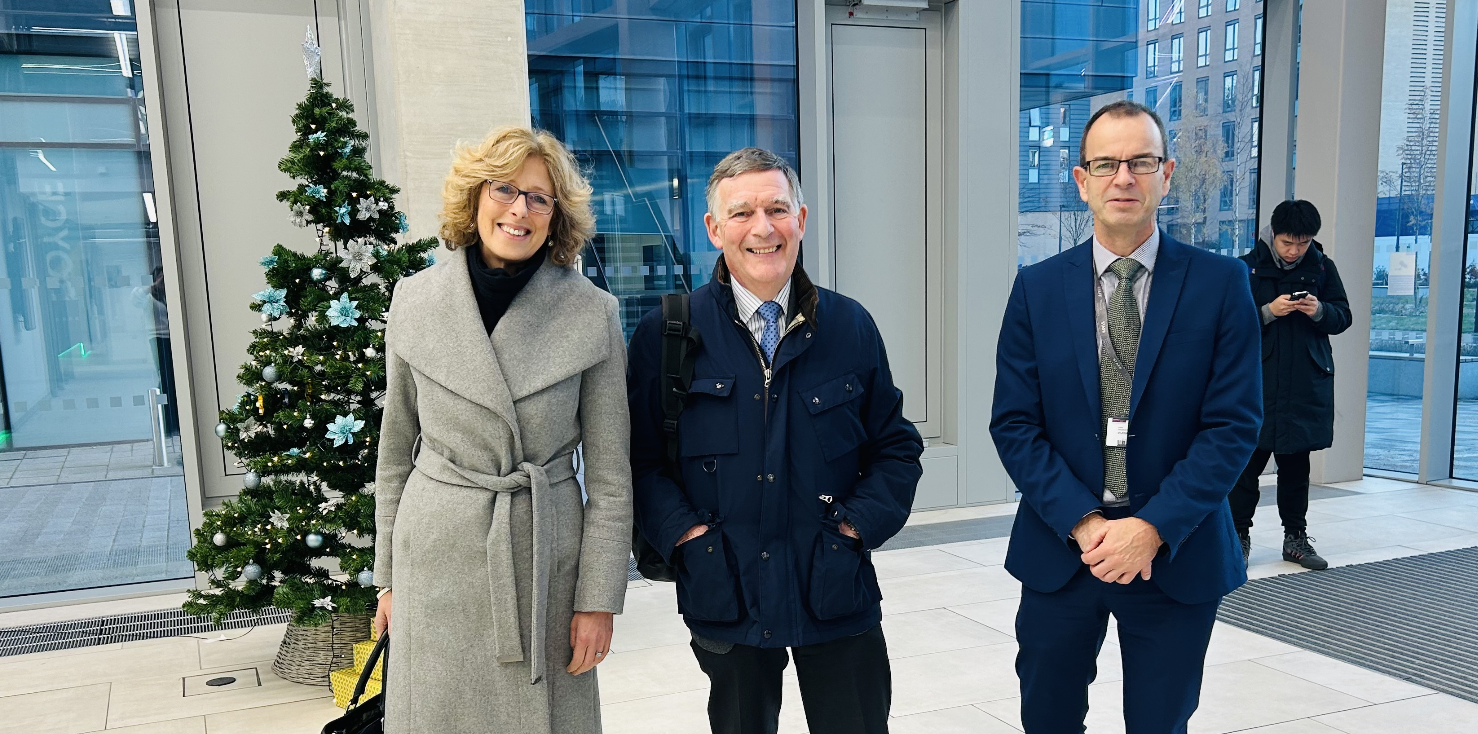The Materials Innovation Leadership Group (MILG), Chaired by Allan Cook CBE, held its first in person meeting earlier this month. The MILG is being facilitated by the Henry Royce Institute, under the direction of its CEO Professor David Knowles. It has been established to oversee and champion the development of a new National Materials Innovation Strategy that will help to tackle major challenges and opportunities that lie ahead for the UK.
The Group is made up of senior representatives spanning a range of industry and key research organisations and is focussed on requirements to expedite the translation of leading-edge UK materials science and research into the new products and services needed to address major policy challenges and commercial opportunities – such as net zero, health improvements and the sustainable use of resources.
A significant part of the meeting was dedicated to exploring the outputs of a number of important cross-sector ‘Cluster’ Working Groups, each led by a Champion and supported by a Sponsor from the Leadership Group. The working groups were focussed on the key value creation opportunity for materials.
These Groups are bringing together sectors which have commonalities to discuss their challenges which have a stake in materials innovating, which in turn will give rise to those key opportunities for the UK. They include:
- Packaging, Fashion and Consumer goods (high volume FMCG)
- Foundation Industries (steel, glass, ceramics, cement, paper, pulp)
- Chemicals and decarbonisation (catalysis, coatings, formulation, materials processing,/reprocessing – incorporating circularity/end of life, carbon-reduction, precision chemicals)
- Energy (nuclear, oil and gas, hydrogen, renewables, traditional power, large-scale energy storage & infrastructure)
- Electronics (Solar, ICT, data industries, quantum technologies, calorics)
- Life Sciences (pharma, medtech, agritech and food)
- Equipment & Machinery (structural engineering, defence, analytical equipment)
- Transport (aerospace, space, marine, automotive, rail)
- Built Environment/Building & Construction (large-scale infrastructure, domestic housing)
Early take-aways from the Working Groups
Supply Chain Management is aligned directly into materials innovation. Materials underpin all of the products and services we use – from the cars we drive to our healthcare systems. It is therefore essential that we do all we can to ensure materials innovation is embedded in supply chain management. New, more complex materials will bring renewed focus on manufacturing design (for making and recycling) and employers will need to invest in upskilling and developing their existing workforce to ensure that they are capable of taking advantage of new material technologies.
Sustainability is a golden thread running through every sector – while this is to be expected, it presents a range of challenges. Linked to the above, it is recognised that globally there is a gap in companies’ ability and agility to provide advanced sustainable materials for manufacturing supply chains and a degree of market failure in industry’s ability to scale-up and adopt sustainable materials in manufacturing applications.
Greater Digitisation (Materials 4.0) current working methods in materials innovation result in delays and failures in commercialisation. In part due to a recurring need for individual organisations to generate experimental data that has often been generated by others, and the lengthy and expensive make, test, manufacture processes inherent in the scale-up framework. Materials 4.0 aims to radically change the rate and responsiveness of materials innovation, increasing the impact it has on society and the economy. The emerging area will provide a new data-centric, digital approach for materials innovation in parallel with targeted experimental work.
Skills Development the development and deployment if innovative materials will continue to demand a high level of technology utilisation, as well as ongoing Research, Development and Innovation – all of which is skills intensive. Indeed nearly all aspects of materials innovation will have a skills dimension – from the increased use of digitisation to entrepreneurial skills required to bring new technologies to market. While we will continue to need more skilled scientists, innovation also relies on many other vocations. We need talent in design and operations, as well as specialist lawyers, financiers and regulators which understand the ambition. And of course we need individuals to continue to pass on their knowledge, teachers, academics and trainers.
Chair of the Materials Innovation Leadership Group, Allan Cook CBE said:
“Since its inception Royce has recognised the need for an influential body to help to shape the UK’s materials research, development and innovation agenda, to drive an evidence-base for investment and present research-related imperatives and recommendations against the backdrop of pressing economic and societal drivers.
“We are making great progress in developing a cross-sectoral, holistic strategy designed to open up economic opportunity for trailblazing materials and materials’ technologies, as well as providing the drive the UK needs in order to achieve one of its most pressing goals: net zero. Innovation in materials, including properties that could deliver advances in energy storage, renewable energy generation and energy efficiency, will provide the solutions to many of the challenges we face.”
Materials underpins manufacturing, and the UK is one of the largest global manufacturing nations, contributing £203 billion every year to GVA and supporting 5 million jobs. 84% of this manufacturing takes place outside of London and the South East. The importance of materials to the UK economy is therefore clear.
The Strategy development is supported by the Department for Science, Innovation and Technology (DSIT), alongside the Department for Energy Security and Net Zero (DESNZ) and the Department for Business and Trade (DBT), and aligns with its recent Science and Technology Framework, which sets out the key actions needed to secure strategic advantage through science and technology, pursuing the technologies that are most critical to achieving UK policy objectives.
The strategy and its actions will continue to evolve into the future. The Leadership Group will continuously update them, reflecting the ever-developing nature of the UK’s materials innovation capabilities and ecosystem. The new Leadership Group will champion the outputs and drive implementation plans, forming an alliance for materials that will provide opportunities to collaborate, to work with Government and above all, to grow the materials innovation pipeline.
An interim report will be presented to the wider materials community to ensure breadth and depth of involvement and feedback will be solicited via an online survey in Spring next year.

Photo shows: l-r Allan Cook CBE MILG Chair, Professor Julia Sutcliff Chief Scientific Adviser at the Department for Business and Trade and Professor David Knowles Royce CEO



